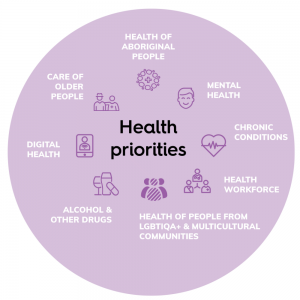
Most of you will be familiar with the concept of health equity, a utopian state that is achieved when everyone can attain their full potential for health and wellbeing. However, health inequalities are systemic, avoidable unfair differences in health outcomes.
While the Australian health care system is one of the best in the world, it can be difficult to access for a number of reasons. Where someone lives, where they come from, what they earn, or the inability to access services that meet their needs, can all impact their health.
Health equity means removing the economic and social barriers to health. WAPHA is aiming through its discrete role in primary care to address barriers.
That’s why our new Strategic Plan 2023-2026 has health equity as its north star. It is guided by the Quintuple Aim for Health Care Improvement, the fifth dimension of health equity, given the Australian Government’s clear direction for PHNs to focus on people who are most at risk of poor health outcomes due to compromised access to health care services. 
Notably, we will have a strengthened focus on diversity and inclusion, with multicultural communities and LGBTIQA+ communities added to our health priority areas.
The Australian Government has also signalled a growing remit for PHNs, seeing us as critical stewards of the primary health care reform agenda with its focus on enabling high quality, integrated, person centred care.
We will work with our commissioned service providers, general practice, aged care and allied health to shape that policy reform and help them navigate it where we can.
The Plan sets out our priorities for the next three years and a path towards our vision of a more connected primary health care system – a system that minimises barriers to accessing primary health care and ensures those with the greatest health needs are cared for as close to home as possible.
Over the past three years, we have progressed the foundational enablers of our work, including tools to support the delivery of safe, high quality, culturally appropriate care and provide better oversight of data, provider performance and patient outcomes.
Internally, we have been focusing on building our digital and data capability and capacity, investing in digital and data systems, infrastructure and literacy.
This will stand us in good stead as we expect there will be an increasingly acute lens on digital health and data, and the need to evidence the outcomes of the activities we commission.
At the request of our Board, we have updated our mission to clearly articulate a focus on a ‘one health system’ philosophy which we are working towards in everything we do. This will be evidenced through facilitating local integrated health precincts and cementing formal partnerships with key jurisdictional agencies.
There is much more in the Plan that we will unpack with our key stakeholders over the coming months, as we roll out its six Strategies. I encourage you to read the Plan and to reach out to me or your usual WAPHA contact, if you have any questions.
